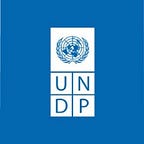Azerbaijan’s Women’s Resource Centers are helping survivors of domestic violence to make their way in the world
Busy at the sewing machine in a small tailor’s shop, Leyla (not her real name) glances up now and again to answer a question from her two sons, aged 19 and 25, who are helping out with her growing business. It’s a far cry from the difficult times she endured for many years.
“I still wake up anxious thinking I’m back in the bad old days,” says Leyla. “There was a long time I didn’t believe I’d make it on my own — let alone run my own business.”
Leyla married and went to live with her parents-in-law at 18. The marriage went fine for the first five years, she says, with her husband working hard as a craftsman as she raised their first son. Then her husband started drinking and becoming abusive — verbally at first but later physically as well.
“I didn’t leave him even though I was scared. I had two young sons to look after by then and I wanted the family to stay together. When he got a job abroad I went with him. But things only got worse.”
Afraid for her safety, Leyla returned to Azerbaijan with her sons. But her parents-in-law blamed the marital problems on her, and though she put up with their criticism for the sake of the children, tensions escalated and she was told to pack her things and leave.
“That was the lowest point but also a turning point because I had no choice but to be independent. I did any job I could find to pay the rent. I tried house-cleaning and working in a café, but the hours weren’t good so I put everything into making clothes.”
Although Leyla managed to get more clients, she didn’t have the space or equipment to meet the demand, and working in a small room with poor-quality equipment while raising two young children was challenging. Then came a second turning-point — the day she joined the Women’s Resource Center recently opened in her town.
“Some clients told me about the Center and said the people there could help me build a proper business. I didn’t have much confidence but I decided to see for myself.”
The Women’s Resource Center that Leyla applied to join was opened with funding from USAID as part of a network set up in 2011 by UNDP and the State Committee for Family, Women and Children Affairs to help empower women in rural areas of Azerbaijan by providing support and training courses in employable skills and small business management.
Another important service offered by the Centers is psycho-social and legal support for women in difficulty, including women who have experienced gender-based violence.
Leyla says the counselling she received at the Center built up her confidence to take a course in business skills. Guided by professional mentors, she developed a business plan and succeeded in applying for a grant to set up her shop.
“As you can see, I got all the equipment I needed!” she says, showing off her high-speed sewing machine, a new iron and other essential equipment she bought with the grant. “It means I don’t have to turn down orders because I can produce much than before.”
The Centers have created safe spaces for thousands of women like Leyla to meet up, exchange ideas and build networks. Some 6,200 women have already taken up free courses in subjects as diverse as women’s human and economic rights, accounting and financial literacy, computer science and networking techniques.
The Centers have continued to work throughout the COVID-19 pandemic, providing many services online.
This support is more important than ever as women disproportionately bear the impacts of the pandemic, including the greater burden of caring for and teaching children who cannot attend school and looking after elderly family members. Women are also at higher risk of domestic violence due to greater economic stress in households combined with increased social isolation.
To address these impacts, UNDP, USAID and UN Women have been working with the Women’s Resource Centers over recent months to organise regular online individual and group psychotherapy sessions for over 800 women from rural regions of Azerbaijan.
In addition, the new 1.8 million USD Stand Up for Women and Girls project funded by USAID will help improve access for women to essential services such as health, legal aid and social support to both help prevent and address gender-based violence. Implemented by UNDP and the State Committee, this project will further boost the capacity of the Centers to advance women’s economic empowerment over the next four years.
“My advice for women like me is to never think of yourself as dependent,” says Leyla. “You don’t have to put up with abuse like I did, especially now there are Centers to help us get back on our feet.”
